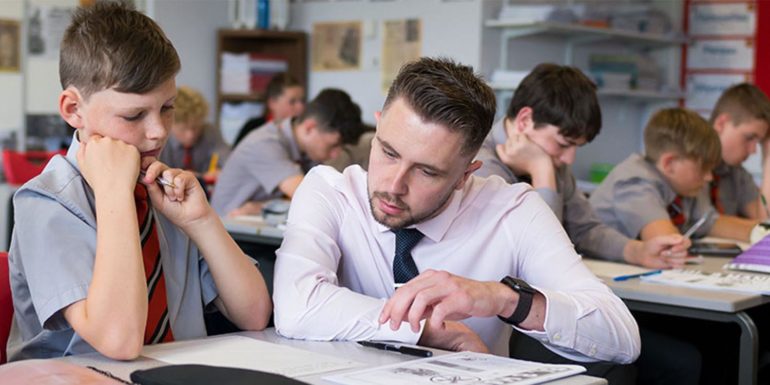Some describe online learning as ‘almost impossible’
TRAINEE teachers have had to adapt to online learning and classroom restrictions, in addition to navigating the usual work their academic qualifications demand.
Since February 22 schools in Wales have been conducting a phased return to the classroom in addition to the continuing teaching of pupils whose parents are key workers.

“I definitely found the online learning challenging,” said Isaac Thomas, 21, a newly qualified primary school teacher at Ysgol Gynradd Gymraeg Cwmnedd.
Despite unprecedented times, Adam Marsden, who is completing the salaried route for the Postgraduate Certificate in Education at the Open University, feels confident in his ability and future as a teacher.
“The new challenges that all student teachers had to take on this year has shown our capability to adapt and persevere when things become difficult,” said Mr Marsden.
Virtual learning has been an adjustment for all teachers, but this can be especially daunting for a trainee or newly qualified teacher as they try to build relationships with the pupils.
“I felt the children couldn’t learn as much as face to face, not every child was engaged and there was only so much variation I could do online,” he said.
Differing learning abilities and attempting to accommodate every child and parent made the job seem “almost impossible” said Mr Thomas.
Andrew Marsh, a student teacher at Cardiff Metropolitan University, said forming relationships with the pupils was difficult when teaching online but has seen it as a positive opportunity to enhance his skills.
“It has given me an insight into both Google classrooms and blended learning and my digital competence has massively increased,” he said.
Mr Marsden, 29, added:
“We are the student teachers who had to come up with creative ways to engage learners and track their progress through many different online platforms.
“I feel these skills will carry positively into future teaching endeavours.”
Despite the PGCE being different to what was expected because of lockdown, Mr Marsh, said he has still received valuable experience from the course.
Mr Marsden, also describes his PGCE experience as a positive one, despite the circumstances. In 2020 he was able to teach face-to-face:
“During this period, I was able to gain invaluable insight from my mentor and other teachers in the school with plenty of opportunity to get involved with teaching lessons and activities.”
Mr Marsh, 22, is looking forward to being back in the classroom, “prior to the Christmas break I found myself enjoying the role of a teacher”.
Since returning to the classroom two weeks ago, Mr Thomas has noticed a decline in some children’s ability to write and their fluency in Welsh.
He has adopted a “back to basics” approach in order to help the children adjust back into school life.
Mr Thomas, 21, feels frustrated that teachers aren’t prioritised in the vaccine roll-out.
“We’ve just started doing these lateral flow tests, which give you results in half an hour. It’s kind of frustrating I feel. The government feel the need for constant testing, but we aren’t prioritised for the vaccine.”
In Wales the vaccine roll-out began with prioritising key workers and is now based on age groups.
Laura Doel, Director of National Association Head Teachers Cymru said: “Our education workforce is being relied upon to lead Wales out of the pandemic. They are being required to work with large groups of people who carry at least as much potential for infection as anyone else.
“A sick teacher is a teacher away from class which will mean further disruption to a pupil’s education and could well mean that they may need to be educated from home again.”



